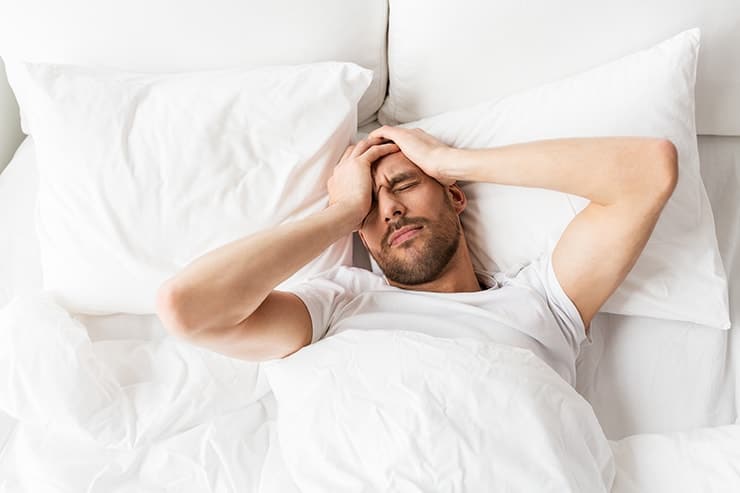Lots of people wake up in the morning feeling well-rested and ready to tackle the day. But for those who wake up with headaches, it can be difficult to get off on the right foot in the morning. If you tend to experience early morning headaches, there could be a few possible reasons why.

Depression and Anxiety
You may already know that depression and anxiety can disrupt sleep, causing insomnia, or even oversleeping. But according to some research, an early morning headache could also be a result of depression and anxiety. Over 9,000 study participants were screened for depression, anxiety, and headaches. Researchers discovered that medication overuse headaches, tension headaches, and migraines were all common in people who suffer from depression, anxiety, or both.
If you wake up with a headache and are diagnosed with depression or anxiety, they could be linked. This would be a good thing to address with your doctor, particularly if you are taking medication for mental illness. Medications could be the cause of your headache.
If you have not been diagnosed with depression, look for other symptoms, such as:
- Overeating or loss of appetite
- Weight gain or weight loss
- Suicidal ideation
- Irritability
- Loss of interest
If you have some of these symptoms, ask your doctor whether depression or anxiety could be linked to your headaches.
Bruxism
Bruxism is just a fancy word for clenching or grinding your teeth. While some people experience bruxism during the day, it’s also common for people to have sleep bruxism, where they unknowingly clench or grind their teeth while asleep. Creating that tension in your jaw can translate into headaches overnight. Of course, sleep bruxism can also cause excessive wear and tear on your teeth, and can even lead to the development of TMJ.
If your headaches are a result of bruxism, you will probably also wake up with jaw soreness, and your dentist will be able to see the impacts of it on your teeth when you go in for a checkup or cleaning. You might also experience other TMJ symptoms like ringing in the ears, vertigo, ear pain, ear fullness, joint sounds, or tingling in the fingers.
Migraine
Many people who have migraines have their attacks first thing in the morning. Endorphins are chemicals in your brain that act as natural pain relievers. Your endorphin levels can drop overnight, triggering migraines. Migraines might also be linked to your bruxism, either through the action of specific muscles, the pressure these muscles put on certain nerves, or the way they stimulate the nerves that control them.
If your headaches are migraines, you might also experience symptoms like:
- Sensitivity to light
- Sensitivity to noise
- Nausea
- Vision problems
In some cases, sleep disorders might be triggering your migraines. If that’s the case, treatment of the sleep disorder might reduce your migraine frequency by more than 90%!
Sleep Disorders
Another common cause of morning headaches are sleep disorders like obstructive sleep apnoea. If you suffer from sleep apnoea, your airway spontaneously closes while you sleep, cutting off your oxygen supply just for a few seconds at a time. That may not seem like a big deal, but when it happens over and over throughout the night, it can result in a host of dangerous health problems including elevated risk of stroke, heart disease, and kidney disease.
One of the notable symptoms of sleep apnoea is waking up with a headache. Other symptoms include:
- Snoring
- Daytime fatigue
- Poor focus
- Memory problems
- Moodiness
While the standard treatment for sleep apnoea is CPAP, some people find the treatment hard to live with. Light sleepers may find it difficult or impossible to sleep while wearing the device, and people often wake up with dry or sore throats and facial irritation, and even suffer from an increase in nightmares.
Thankfully, a trained sleep dentist can offer an alternative treatment in the form of a simple oral appliance. Similar to an athlete’s bite guard, an oral appliance can hold the jaw in a position that doesn’t allow the airway to collapse.
Do you think you might have sleep apnoea? Call (02) 9686 7375 or contact us online to make an appointment and learn more about a sleep dentist at My Hills Dentist in Baulkham Hills can help.

